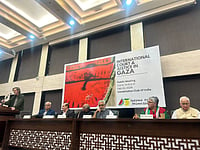On December 27, last year, three Christian tribal women in Narayanpur were stripped publicly, and physically assaulted in front of a hundred onlookers in a bid to outrage their modesty. It was perhaps one out of several incidents that have gone unreported from Chhattisgarh yet come off as alarming in a series of attacks against Adivasi Christians, more so on women, that has seen a rise since 2022.
“Although tool of oppression was targeted against the women, it was an act of inciting fear and violence in the community and forcing them to denounce their faith,” says Delhi-based activist Minakshi Singh.
Since December 2022, in the districts of Narayanpur and Kondagaon of Chhattisgarh, there have been a series of attacks in about 18 villages in Narayanpur and 15 villages in Kondagaon displacing about 1,000 Christian Adivasis, including pregnant women, children and aged persons, from their own villages, according to a statement released by the United Christian Forum (UCF) at the press conference in February last month.
It further added that those displaced were threatened to denounce their Christian faith and convert to Hindu religion failing which they would have to leave their village or face dire consequences. Not only were they ousted by locals, they were also assaulted, their places of worship and homes vandalised, their harvest burnt or plundered, and their livestock and all means of living snatched away. Many Christian Adivasis were assaulted and beaten with bamboo canes, tyres, rods, etc. Several had to be hospitalised with injuries like collarbone fractures, etc.
The violence took an ugly turn when a Catholic church and a grotto of Mother Mary in Edka village, Narayanpur were attacked on January 2 and vandalised by a mob allegedly comprising Hindu extremists. The incident forced evicted hundreds of Christian Adivasis out of the villages on cold wintry nights.
Recalling the memories from the night, Minakshi, who is an eleventh-generation Christian in the country, says, “Pregnant women, elderly men and children were all seated on roads for hours and days without sufficient layers of clothing. It was an extremely difficult situation for them and for witnesses who were trying to arrange for help.”
Although relief camps were set up in places in Chhattisgarh and an interim order from the Chhattisgarh High Court dated January 13, 2023, directed the District Collector of Kondagaon and the Police Commissioner, Bastar Division to ensure basic amenities to displaced Christian Adivasis halted in relief camps, it seems just an “option” to overlook the underlying issues causing a threat to the lives of women and children in these areas.
“No use of relief camps unless security is beefed on the ground and certain politically backed groups don’t stop inciting violence. Relief camps are just an option,” says Minakshi.
Citing another incident of mindless violence against women, activists recall that on May 2 last year, an incident was reported to UCF from the Bastar region of Chhattisgarh, about a family that was being pressurised to deny their faith by cutting off their access to water and other fundamentals.
According to the statement of the UCF, while the woman of the family made her way to the second-nearest source of water, a few kilometers away, she was intercepted and assaulted by a group of locals. She sustained serious injuries and had to be hospitalised.
Minakshi says that although a complaint was also filed against the miscreants, to no avail.
“The Bastar region of Chhattisgarh has been long witnessing unrest and tension over religious conversions, this is perhaps the first time that there seems to be an organised, large-scale violence against the Christian Advasis,” a social activist (name withheld on request) had told Outlook earlier.
Women face a double jeopardy
“Wherever there is violence, there is a so-called double-dominant effect on women. They are at the receiving end of the most violent acts because of their fragile nature,” says Manju Devarapalli, Secretary of National Dalit Christian Watch.
Devarapalli points out that several social factors play at the ground level where women of the marginalised caste and section otherwise feel a sense of oppression.
“Women, in general, are more vulnerable and exposed to pain and suffering inflicted due to social factors. Adding on to that, women from the marginalised section face a double whammy of patriarchy and societal evils where they are denied their basic rights,” says Devarapalii.
Discrimination within the Christian community
Drawing a parallel between the oppression faced by Adivasis and Dalits, both of whom are branded due to their so-called low status vis-a-vis the dominant Hindu society, Devarappali sheds light on the gamut of discrimination perpetuated within Christianity. Citing examples of incidents, she speaks of how Dalit women, who have converted to Christianity, are discriminated against within churches and excluded from religious affairs.
“Their participation is not included in the decision-making processes of the church, let alone lending an ear to the difficulties faced by them. In addition to that, they are further cornered because they were Dalit once upon a time,” she says.
The combined forces of patriarchy, hierarchy and the caste system have affected Dalit women in the “worst possible” ways.
Devaraplli notes that within the churches, discrimination is much more than what the eyes can meet.
“Once they convert to Christianity, they lose the benefits of the Dalit reservation at the state level and even at the church level. And the deplorable conditions that follow, are pathetic.”


























